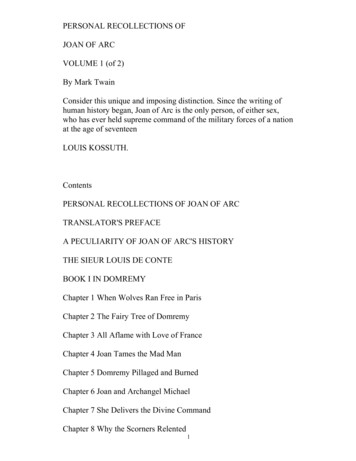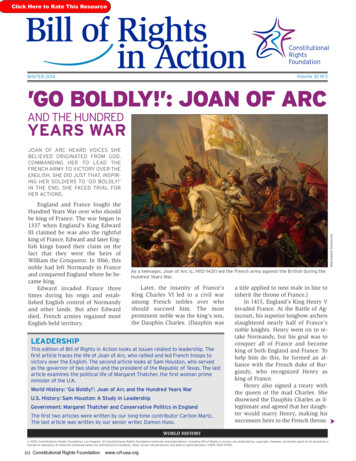
Transcription
Personal Recollections of Joan of Arc, Volume 1 by MarkTwainPersonal Recollections of Joan of Arc, Volume 1 by Mark TwainPrepared by David Reed haradda@aol.com or davidr@inconnect.comPersonal Recollections of Joan of Arc Vol. 1by Mark TwainConsider this unique and imposing distinction. Since the writing ofhuman history began, Joan of Arc is the only person, of either sex,who has ever held supreme command of the military forces of anation at the age of seventeenLOUIS KOSSUTH.ContentsTranslator's PrefaceA Peculiarity of Joan of Arc's HistoryThe Sieur Louis de Contepage 1 / 344
Book I -- IN DOMREMY1 When Wolves Ran Free in Paris3 All Aflame with Love of France4 Joan Tames the Mad Man5 Domremy Pillaged and Burned6 Joan and Archangel Michael7 She Delivers the Divine Command8 Why the Scorners RelentedBook II -- IN COURT AND CAMP1 Joan Says Good-By2 The Governor Speeds Joan3 The Paladin Groans and Boasts4 Joan Leads Us Through the Enemy5 We Pierce the Last Ambuscades6 Joan Convinces the King7 Our Paladin in His Glory8 Joan Persuades the Inquisitors9 She Is Made General-in-Chief10 The Maid's Sword and Banner11 The War March Is Begun12 Joan Puts Heart in Her Armypage 2 / 344
13 Checked by the Folly of the Wise14 What the English Answered15 My Exquisite Poem Goes to Smash16 The Finding of the Dwarf17 Sweet Fruit of Bitter Truth18 Joan's First Battle-Field19 We Burst In Upon Ghosts20 Joan Makes Cowards Brave Victors21 She Gently Reproves Her Dear Friend22 The Fate of France Decided23 Joan Inspires the Tawdry King24 Tinsel Trappings of Nobility25 At Last--Forward!26 The Last Doubts Scattered27 How Joan Took JargeauPERSONAL RECOLLECTIONS OF JOAN OF ARCby THE SIEUR LOUIS DE CONTE(her page and secretary)In Two VolumesVolume 1.Freely translated out of the ancient French into modern Englishfrom the original unpublished manuscript in the National Archivespage 3 / 344
of FranceAuthorities examined in verification of the truthfulness of thisnarrative:d'Arc.H. A. WALLON, Jeanne d'Arc.M. SEPET, Jeanne d'Arc.J. MICHELET, Jeanne d'Arc.BERRIAT DE SAINT-PRIX, La Famille de Jeanne d'Arc.La Comtesse A. DE CHABANNES, La Vierge Lorraine.Lord RONALD GOWER, F.S.A., Joan of Arc. JOHN O'HAGAN,Joan of Arc.JANET TUCKEY, Joan of Arc the Maid.TRANSLATOR'S PREFACETO ARRIVE at a just estimate of a renowned man's character onemust judge it by the standards of his time, not ours. Judged by thestandards of one century, the noblest characters of an earlier onelose much of their luster; judged by the standards of to-day, thereis probably no illustrious man of four or five centuries ago whosecharacter could meet the test at all points. But the character ofJoan of Arc is unique. It can be measured by the standards of allpage 4 / 344
times without misgiving or apprehension as to the result. Judgedby any of them, it is still flawless, it is still ideally perfect; it stilloccupies the loftiest place possible to human attainment, a loftierone than has been reached by any other mere mortal.When we reflect that her century was the brutalest, the wickedest,the rottenest in history since the darkest ages, we are lost inwonder at the miracle of such a product from such a soil. Thecontrast between her and her century is the contrast between dayand night. She was truthful when lying was the common speech ofmen; she was honest when honesty was become a lost virtue; shewas a keeper of promises when the keeping of a promise wasexpected of no one; she gave her great mind to great thoughts andgreat purposes when other great minds wasted themselves uponpretty fancies or upon poor ambitions; she was modest, and fine,and delicate when to be loud and coarse might be said to beuniversal; she was full of pity when a merciless cruelty was therule; she was steadfast when stability was unknown, and honorablein an age which had forgotten what honor was; she was a rock ofconvictions in a time when men believed in nothing and scoffed atall things; she was unfailingly true to an age that was false to thecore; she maintained her personal dignity unimpaired in an age offawnings and servilities; she was of a dauntless courage when hopeand courage had perished in the hearts of her nation; she wasspotlessly pure in mind and body when society in the highestplaces was foul in both--she was all these things in an age whencrime was the common business of lords and princes, and whenpage 5 / 344
the highest personages in Christendom were able to astonish eventhat infamous era and make it stand aghast at the spectacle of theiratrocious lives black with unimaginable treacheries, butcheries,and beastialities.She was perhaps the only entirely unselfish person whose namehas a place in profane history. No vestige or suggestion ofself-seeking can be found in any word or deed of hers. When shehad rescued her King from his vagabondage, and set his crownupon hi8s head, she was offered rewards and honors, but sherefused them all, and would take nothing. All she would take forherself--if the King would grant it--was leave to go back to hervillage home, and tend her sheep again, and feel her mother's armsabout her, and be her housemaid and helper. The selfishness of thisunspoiled general of victorious armies, companion of princes, andidol of an applauding and grateful nation, reached but that far andno farther.The work wrought by Joan of Arc may fairly be regarded asranking any recorded in history, when one considers the conditionsunder which it was undertaken, the obstacles in the way, and themeans at her disposal. Caesar carried conquests far, but he did itwith the trained and confident veterans of Rome, and was a trainedsoldier himself; and Napoleon swept away the disciplined armiesof Europe, but he also was a trained soldier, and the began hiswork with patriot battalions inflamed and inspired by themiracle-working new breath of Liberty breathed upon them by thepage 6 / 344
Revolution--eager young apprentices to the splendid trade of war,not old and broken men-at-arms, despairing survivors of anage-long accumulation of monotonous defeats; but Joan of Arc, amere child in years, ignorant, unlettered, a poor village girlunknown and without influence, found a great nation lying inchains, helpless and hopeless under an alien domination, itstreasury bankrupt, its soldiers disheartened and dispersed, all spirittorpid, all courage dead in the hearts of the people through longyears of foreign and domestic outrage and oppression, their Kingcowed, resigned to its fate, and preparing to fly the country; andshe laid her hand upon this nation, this corpse, and it rose andfollowed her. She led it from victory to victory, she turned backthe tide of the Hundred Years' War, she fatally crippled the Englishpower, and died with the earned title of DELIVERER OFFRANCE, which she bears to this day.And for all reward, the French King, whom she had crowned,stood supine and indifferent, while French priests took the noblechild, the most innocent, the most lovely, the most adorable theages have produced, and burned her alive at the stake.A PECULIARITY OF JOAN OF ARC'S HISTORYTHE DETAILS of the life of Joan of Arc form a biography whichis unique among the world's biographies in one respect: It is theonly story of a human life which comes to us under oath, the onlypage 7 / 344
one which comes to us from the witness-stand. The official recordsof the Great Trial of 1431, and of the Process of Rehabilitation ofa quarter of a century later, are still preser4ved in the NationalArchives of France, and they furnish with remarkable fullness thefacts of her life. The history of no other life of that remote time isknown with either the certainty or the comprehensiveness thatattaches to hers.The Sieur Louis de Conte is faithful to her official history in hisPersonal Recollections, and thus far his trustworthiness isunimpeachable; but his mass of added particulars must depend forcredit upon his word alone.THE TRANSLATOR.THE SIEUR LOUIS DE CONTETo his Great-Great-Grand Nephews and NiecesTHIS IS the year 1492. I am eighty-two years of age. The things Iam going to tell you are things which I saw myself as a child andas a youth.In all the tales and songs and histories of Joan of Arc, which youand the rest of the world read and sing and study in the bookspage 8 / 344
wrought in the late invented art of printing, mention is made ofme, the Sieur Louis de Conte--I was her page and secretary, I waswith her from the beginning until the end.I was reared in the same village with her. I played with her everyday, when we were little children together, just as you play withyour mates. Now that we perceive how great she was, now that hername fills the whole world, it seems strange that what I am sayingis true; for it is as if a perishable paltry candle should speak of theeternal sun riding in the heavens and say, "He was gossip andhousemate to me when we were candles together." And yet it istrue, just as I say. I was her playmate, and I fought at her side inthe wars; to this day I carry in my mind, fine and clear, the pictureof that dear little figure, with breast bent to the flying horse's neck,charging at the head of the armies of France, her hair streamingback, her silver mail plowing steadily deeper and deeper into thethick of the battle, sometimes nearly drowned from sight bytossing heads of horses, uplifted sword-arms, wind-blow plumes,and intercepting shields. I was with her to the end; and when thatblack day came whose accusing shadow will lie always upon thememory of the mitered French slaves of England who were herassassins, and upon France who stood idle and essayed no rescue,my hand was the last she touched in life.As the years and the decades drifted by, and the spectacle of themarvelous child's meteor flight across the war firmament of Franceand its extinction in the smoke-clouds of the stake receded deeperpage 9 / 344
and deeper into the past and grew ever more strange, andwonderful, and divine, and pathetic, I came to comprehend andrecognize her at last for what she was--the most noble life that wasever born into this world save only One.BOOK I IN DOMREMYChapter 1 When Wolves Ran Free in ParisI, THE SIEUR LOUIS DE CONTE, was born in Neufchateau, onthe 6th of January, 1410; that is to say, exactly two years beforeJoan of Arc was born in Domremy. My family had fled to thosedistant regions from the neighborhood of Paris in the first years ofthe century. In politics they were Armagnacs--patriots; they werefor our own French King, crazy and impotent as he was. TheBurgundian party, who were for the English, had stripped them,and done it well. They took everything but my father's smallnobility, and when he reached Neufchateau he reached it inpoverty and with a broken spirit. But the political atmosphere therewas the sort he liked, and that was something. He came to a regionof comparative quiet; he left behind him a region peopled withfuries, madmen, devils, where slaughter was a daily pastime andno man's life safe for a moment. In Paris, mobs roared through thestreets nightly, sacking, burning, killing, unmolested,uninterrupted. The sun rose upon wrecked and smoking buildings,and upon mutilated corpses lying here, there, and yonder about thepage 10 / 344
streets, just as they fell, and stripped naked by thieves, the unholygleaners after the mob. None had the courage to gather these deadfor burial; they were left there to rot and create plagues.And plagues they did create. Epidemics swept away the peoplelike flies, and the burials were conducted secretly and by night, forpublic funerals were not allowed, lest the revelation of themagnitude of the plague's work unman the people and plunge theminto despair. Then came, finally, the bitterest winter which hadvisited France in five hundred years. Famine, pestilence, slaughter,ice, snow--Paris had all these at once. The dead lay in heaps aboutthe streets, and wolves entered the city in daylight and devouredthem.Ah, France had fallen low--so low! For more than three quarters ofa century the English fangs had been bedded in her flesh, and socowed had her armies become by ceaseless rout and defeat that itwas said and accepted that the mere sight of an English army wassufficient to put a French one to flight.When I was five years old the prodigious disaster of Agincourt fellupon France; and although the English King went home to enjoyhis glory, he left the country prostrate and a prey to roving bandsof Free Companions in the service of the Burgundian party, andone of these bands came raiding through Neufchateau one night,and by the light of our burning roof-thatch I saw all that were dearpage 11 / 344
to me in this world (save an elder brother, your ancestor, leftbehind with the court) butchered while they begged for mercy, andheard the butchers laugh at their prayers and mimic theirpleadings. I was overlooked, and escaped without hurt. When thesavages were gone I crept out and cried the night away watchingthe burning houses; and I was all alone, except for the company ofthe dead and the wounded, for the rest had taken flight and hiddenthemselves.I was sent to Domremy, to the priest, whose housekeeper became aloving mother to me. The priest, in the course of time, taught meto read and write, and he and I were the only persons in the villagewho possessed this learning.At the time that the house of this good priest, Guillaume Fronte,became my home, I was six years old. We lived close by thevillage church, and the small garden of Joan's parents was behindthe church. As to that family there were Jacques d'Arc the father,his wife Isabel Romee; three sons--Jacques, ten years old, Pierre,eight, and Jean, seven; Joan, four, and her baby sister Catherine,about a year old. I had these children for playmates from thebeginning. I had some other playmates besides--particularly fourAubrey, whose father was maire at that time; also two girls, aboutJoan's age, who by and by became her favorites; one was namedHaumetter, the other was called Little Mengette. These girls werecommon peasant children, like Joan herself. When they grew up,page 12 / 344
both married common laborers. Their estate was lowly enough,you see; yet a time came, many years after, when no passingstranger, howsoever great he might be, failed to go and pay hisreverence to those to humble old women who had been honored intheir youth by the friendship of Joan of Arc.These were all good children, just of the ordinary peasant type; notbright, of course--you would not expect that--but good-hearted andcompanionable, obedient to their parents and the priest; and asthey grew up they became properly stocked with narrowness andprejudices got at second hand from their elders, and adoptedwithout reserve; and without examination also--which goeswithout saying. Their religion was inherited, their politics thesame. John Huss and his sort might find fault with the Church, inDomremy it disturbed nobody's faith; and when the split came,when I was fourteen, and we had three Popes at once, nobody inDomremy was worried about how to choose among them--thePope of Rome was the right one, a Pope outside of Rome was noPope at all. Every human creature in the village was anArmagnac--a patriot--and if we children hotly hated nothing else inthe world, we did certainly hate the English and Burgundian nameand polity in that way.OUR DOMREMY was like any other humble little hamlet of thatremote time and region. It was a maze of crooked, narrow lanespage 13 / 344
and alleys shaded and sheltered by the overhanging thatch roofs ofthe barnlike houses. The houses were dimly lighted bywooden-shuttered windows--that is, holes in the walls whichserved for windows. The floors were dirt, and there was very littlefurniture. Sheep and cattle grazing was the main industry; all theyoung folks tended flocks.The situation was beautiful. From one edge of the village a floweryplain extended in a wide sweep to the river--the Meuse; from therear edge of the village a grassy slope rose gradually, and at the topwas the great oak forest--a forest that was deep and gloomy anddense, and full of interest for us children, for many murders hadbeen done in it by outlaws in old times, and in still earlier timesprodigious dragons that spouted fire and poisonous vapors fromtheir nostrils had their homes in there. In fact, one was still livingin there in our own time. It was as long as a tree, and had a body asbig around as a tierce, and scales like overlapping great tiles, anddeep ruby eyes as large as a cavalier's hat, and an anchor-fluke onits tail as big as I don't know what, but very big, even unusually sofor a dragon, as everybody said who knew about dragons. It wasthought that this dragon was of a brilliant blue color, with goldmottlings, but no one had ever seen it, therefore this was notknown to be so, it was only an opinion. It was not my opinion; Ithink there is no sense in forming an opinion when there is noevidence to form it on. If you build a person without any bones inh8im he may look fair enough to the eye, but he will be limber andcannot stand up; and I consider that evidence is the bones of anpage 14 / 344
opinion. But I will take up this matter more at large at anothertime, and try to make the justness of my position appear. As to thatdragon, I always held the belief that its color was gold and withoutblue, for that has always been the color of dragons. That thisdragon lay but a little way within the wood at one time is shown bythe fact that Pierre Morel was in there one day and smelt it, andrecognized it by the smell. It gives one a horrid idea of how near tous the deadliest danger can be and we not suspect it.In the earliest times a hundred knights from many remote places inthe earth would have gone in there one after another, to kill thedragon and get the reward, but in our time that method had goneout, and the priest had become the one that abolished dragons.with candles and incense and banners, and marched around theedge of the wood and exorcised the dragon, and it was never heardof again, although it was the opinion of many that the smell neverwholly passed away. Not that any had ever smelt the smell again,for none had; it was only an opinion, like that other--and lackedbones, you see. I know that the creature was there before theexorcism, but whether it was there afterward or not is a thingwhich I cannot be so positive about.In a noble open space carpeted with grass on the high groundtoward Vaucouleurs stood a most majestic beech tree withwide-reaching arms and a grand spread of shade, and by it a limpidspring of cold water; and on summer days the children wentpage 15 / 344
there--oh, every summer for more than five hundred years--wentthere and sang and danced around the tree for hours together,refreshing themselves at the spring from time to time, and it wasmost lovely and enjoyable. Also they made wreaths of flowers andhung them upon the tree and about the spring to please the fairiesthat lived there; for they liked that, being idle innocent littlecreatures, as all fairies are, and fond of anything delicate andpretty like wild flowers put together in that way. And in return forthis attention the fairies did any friendly thing they could for thechildren, such as keeping the spring always full and clear and cold,and driving away serpents and insects that sting; and so there wasnever any unkindness between the fairies and the children duringmore than five hundred years--tradition said a thousand--but onlythe warmest affection and the most perfect trust and confidence;and whenever a child died the fairies mourned just as that child'splaymates did, and the sign of it was there to see; for before thedawn on the day of the funeral they hung a little immortelle overthe place where that child was used to sit under the tree. I knowthis to be true by my own eyes; it is not hearsay. And the reason itwas known that the fairies did it was this--that it was made all ofblack flowers of a sort not known in France anywhere.Now from time immemorial all children reared in Domremy werecalled the Children of the Tree; and they loved that name, for itcarried with it a mystic privilege not granted to any others of thechildren of this world. Which was this: whenever one of thesecame to die, then beyond the vague and formless images driftingpage 16 / 344
through his darkening mind rose soft and rich and fair a vision ofthe Tree--if all was well with his soul. That was what some said.Others said the vision came in two ways: once as a warning, one ortwo years in advance of death, when the soul was the captive ofsin, and then the Tree appeared in its desolate winter aspect--thenthat soul was smitten with an awful fear. If repentance came, andpurity of life, the vision came again, this time summer-clad andbeautiful; but if it were otherwise with that soul the vision waswithheld, and it passed from life knowing its doom. Still otherssaid that the vision came but once, and then only to the sinlessdying forlorn in distant lands and pitifully longing for some lastdear reminder of their home. And what reminder of it could go totheir hearts like the picture of the Tree that was the darling of theirlove and the comrade of their joys and comforter of their smallgriefs all through the divine days of their vanished youth?Now the several traditions were as I have said, some believing oneand some another. One of them I knew to be the truth, and that wasthe last one. I do not say anything against the others; I think theywere true, but I only know that the last one was; and it is mythought that if one keep to the things he knows, and not troubleabout the things which he cannot be sure about, he will have thest3eadier mind for it--and there is profit in that. I know that whenthe Children of the Tree die in a far land, then--if they be at peacewith God--they turn their longing eyes toward home, and there,far-shining, as through a rift in a cloud that curtains heaven, theysee the soft picture of the Fairy Tree, clothed in a dream of goldenpage 17 / 344
light; and they see the bloomy mead sloping away to the river, andto their perishing nostrils is blown faint and sweet the fragrance ofthe flowers of home. And then the vision fades and passes--b theyknow, they know! and by their transfigured faces you know also,you who stand looking on; yes, you know the message that hascome, and that it has come from heaven.Joan and I believed alike about this matter. But Pierre Morel andJacques d'Arc, and many others believed that the vision appearedtwice--to a sinner. In fact, they and many others said they knew it.Probably because their fathers had known it and had told them; forone gets most things at second hand in this world.Now one thing that does make it quite likely that there were reallytwo apparitions of the Tree is this fact: From the most ancienttimes if one saw a villager of ours with his face ash-white and rigidwith a ghastly fright, it was common for every one to whisper tohis neighbor, "Ah, he is in sin, and has got his warning." And theneighbor would shudder at the thought and whisper back, "Yes,poor soul, he has seen the Tree."Such evidences as these have their weight; they are not to be putaside with a wave of the hand. A thing that is backed by thecumulative evidence of centuries naturally gets nearer and nearerto being proof all the time; and if this continue and continue, itwill some day become authority--and authority is a bedded rock,page 18 / 344
and will abide.In my long life I have seen several cases where the tree appearedannouncing a death which was still far away; but in none of thesewas the person in a state of sin. No; the apparition was in thesecases only a special grace; in place of deferring the tidings of thatsoul's redemption till the day of death, the apparition brought themlong before, and with them peace--peace that might no more bedisturbed--the eternal peace of God. I myself, old and broken, waitwith serenity; for I have seen the vision of the Tree. I have seen it,and am content.Always, from the remotest times, when the children joined handsand danced around the Fairy Tree they sang a song which was theTree's song, the song of L'Arbre fee de Bourlemont. They sang it toa quaint sweet air--a solacing sweet air which has gone murmuringthrough my dreaming spirit all my life when I was weary andtroubled, resting me and carrying me through night and distancehome again. No stranger can know or feel what that song has been,through the drifting centuries, to exiled Children of the Tree,homeless and heavy of heart in countries foreign to their speechand ways. You will think it a simple thing, that song, and poor,perchance; but if you will remember what it was to us, and what itbrought before our eyes when it floated through our memories,then you will respect it. And you will understand how the waterwells up in our eyes and makes all things dim, and our voicesbreak and we cannot sing the last lines:page 19 / 344
"And when, in Exile wand'ring, weShall fainting yearn for glimpse of thee,Oh, rise upon our sight!"And you will remember that Joan of Arc sang this song with usaround the Tree when she was a little child, and always loved it.And that hallows it, yes, you will grant that:SONG OF THE CHILDRENNow what has kept your leaves so green,The children's tears! They brought each grief,And you did comfort them and cheerTheir bruised hearts, and steal a tearThat, healed, rose a leaf.And what has built you up so strong,The children's love! They've loved you longpage 20 / 344
Ten hundred years, in sooth,They've nourished you with praise and song,And warmed your heart and kept it young-A thousand years of youth!Bide always green in our young hearts,And we shall always youthful be,Not heeding Time his flight;And when, in exile wand'ring, weShall fainting yearn for glimpse of thee,Oh, rise upon our sight!The fairies were still there when we were children, but we neversaw them; because, a hundred years before that, the priest ofDomremy had held a religious function under the tree anddenounced them as being blood-kin to the Fiend and barred themfrom redemption; and then he warned them never to showthemselves again, nor hang any more immortelles, on pain ofperpetual banishment from that parish.All the children pleaded for the fairies, and said they were theirgood friends and dear to them and never did them any harm, butthe priest would not listen, and said it was sin and shame to havesuch friends. The children mourned and could not be comforted;and they made an agreement among themselves that they wouldalways continue to hang flower-wreaths on the tree as a perpetualpage 21 / 344
sign to the fairies that they were still loved and remembered,though lost to sight.But late one night a great misfortune befell. Edmond Aubrey'smother passed by the Tree, and the fairies were stealing a dance,not thinking anybody was by; and they were so busy, and sointoxicated with the wild happiness of it, and with the bumpers ofdew sharpened up with honey which they had been drinking, thatthey noticed nothing; so Dame Aubrey stood there astonished andadmiring, and saw the little fantastic atoms holding hands, as manyas three hundred of them, tearing around in a great ring half as bigas an ordinary bedroom, and leaning away back and spreadingtheir mouths with laughter and song, which she could hear quitedistinctly, and kicking their legs up as much as three inches fromthe ground in perfect abandon and hilarity--oh, the very maddestand witchingest dance the woman ever saw.But in about a minute or two minutes the poor little ruinedcreatures discovered her. They burst out in one heartbreakingsqueak of grief and terror and fled every which way, with their weehazel-nut fists in their eyes and crying; and so disappeared.The heartless woman--no, the foolish woman; she was notheartless, but only thoughtless--went straight home and told theneighbors all about it, whilst we, the small friends of the fairies,were asleep and not witting the calamity that was come upon us,page 22 / 344
and all unconscious that we ought to be up and trying to stop thesefatal tongues. In the morning everybody knew, and the disaster wascomplete, for where everybody knows a thing the priest knows it,he had to cry, too, seeing our sorrow, for he had a most kind andgentle nature; and he did not want to banish the fairies, and saidso; but said he had no choice, for it had been decreed that if theyever revealed themselves to man again, they must go. This allhappened at the worst time possible, for Joan of Arc was ill of afever and out of her head, and what could we do who had not hergifts of reasoning and persuasion? We flew in a swarm to her bedand cried out, "Joan, wake! Wake, there is no moment to lose!Come and plead for the fairies--come and save them; only you cando it!"But her mind was wandering, she did not know what we said norwhat we meant; so we went away knowing all was lost. Yes, allwas lost, forever lost; the faithful friends of the children for fivehundred years must go, and never come back any more.function under the tree and banished the fairies. We could notwear mourning that any could have noticed, it would not havebeen allowed; so we had to be content with some poor small rag ofblack tied upon our garments where it made no show; but in ourhearts we wore mourning, big and noble and occupying all theroom, for our hearts were ours; they could not get at them toprevent that.page 23 / 344
name--was never afterward quite as much to us as it had beenbefore, but it was always dear; is dear to me yet when I got therenow, once a year in my old age, to sit under it and bring back thelost playmates of my youth and group them about me and lookupon their faces through my tears and break my heart, oh, my God!No, the place was not quite the same afterward. In one or two waysit could not be; for,
Personal Recollections of Joan of Arc Vol. 1 by Mark Twain Consider this unique and imposing distinction. Since the writing of human history began, Joan of Arc is the only person, of either sex, who has ever held supreme command of the military forces of a nation at the age of seventeen LOUIS KOSSUTH. Contents Translator's Preface A Peculiarity .










